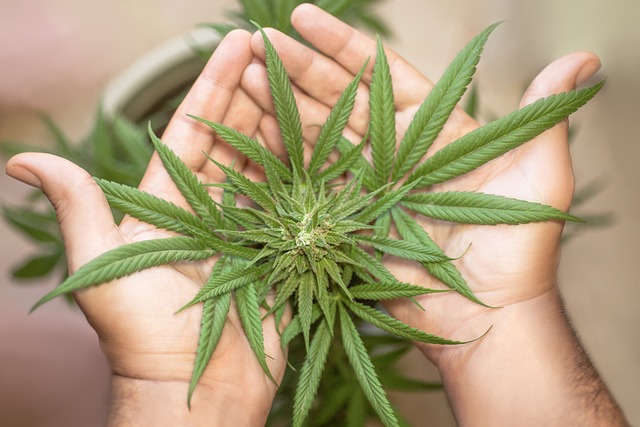The THCA flower, a non-psychoactive form of cannabis rich in myrcene, limonene, and caryophyllene terpenes, offers potential health benefits and therapeutic effects due to its unique chemical makeup. These terpenes affect the plant’s aroma, flavor, and how it interacts with human physiology and the endocannabinoid system. They can modulate psychoactive effects, provide analgesic relief, and offer health benefits. Consumers are increasingly seeking out strains that cater to their specific health needs based on these terpene profiles. It’s crucial for users to understand the influence of terpenes, start with low doses, and be aware of potential side effects like dry mouth and eyes. Due to its interactions with other cannabinoids, THCA can sometimes cause psychoactive effects. Safety is paramount, as it may interact with certain medications or health conditions, and pregnant or breastfeeding women should avoid it. Users must navigate the complex legal landscape that varies by region and engage in responsible consumption to promote ethical sourcing and sustainable industry growth. Comprehension of the THCA flower’s terpene profiles is essential for informed, safe, and effective use within the legal boundaries set by state and local laws.
Exploring the nuanced effects of THCA flower terpene profiles on consumer health, this article sheds light on their potential side effects and safety considerations. We delve into the intricate world of cannabinoids and terpenes, offering an in-depth analysis of the associated benefits and risks. Furthermore, we navigate the complex legal landscape governing hemp flower THCA use, emphasizing ethical consumption practices to ensure responsible engagement with this natural substance. Join us as we dissect the science behind THCA flower terpene profiles and their implications for health and well-being.
- Unraveling the Effects of THCA Flower Terpene Profiles on Consumer Health
- An In-Depth Analysis of THCA Flower Side Effects and Safety Considerations
- Navigating the Legal Landscape and Ethical Use of THCA Flower with Terpene Rich Profiles
Unraveling the Effects of THCA Flower Terpene Profiles on Consumer Health

The exploration into the effects of THCA flower terpene profiles on consumer health is a multifaceted endeavor, as the unique chemical makeup of cannabis can significantly influence its interactions with the human body. Terpenes, the volatile compounds found in the THCA flower, are not only responsible for the distinct aromas and flavors but also play a pivotal role in modulating the therapeutic properties of the plant. These profiles can enhance or mitigate the psychoactive effects of THC, offer analgesic benefits, and potentially interact with the body’s endocannabinoid system to produce various health outcomes. Research indicates that certain terpene combinations, such as myrcene, limonene, and caryophyllene, can augment the therapeutic efficacy of THCA, suggesting a synergistic effect that may be beneficial for conditions ranging from anxiety and depression to chronic pain and inflammation. As consumers become more informed about these terpene profiles, they are increasingly seeking out strains tailored to their specific health needs, thereby highlighting the importance of understanding the intricate relationship between cannabis terpenes and consumer well-being. It is through this nuanced examination that we can better appreciate the multifaceted impact of THCA flower on individual health, guiding both medical and recreational use with greater precision and care.
An In-Depth Analysis of THCA Flower Side Effects and Safety Considerations

Delta-9 tetrahydrocannabinolic acid (THCA) is the non-psychoactive precursor to the well-known psychoactive compound delta-9 THC found in the cannabis plant. As interest in the therapeutic properties of cannabis continues to grow, so does the exploration of its various compounds, including THCA. The THCA flower, rich in terpene profiles such as myrcene, limonene, and caryophyllene, is gaining attention for its potential health benefits. However, it’s crucial to approach its use with a comprehensive understanding of its side effects and safety considerations.
Consumption of THCA flower can lead to mild side effects, which typically include dry mouth and dry eyes, often referred to as ‘cottonmouth’ and ‘red eyes.’ These are usually temporary and resolve once consumption is ceased. Additionally, some users may experience dizziness or altered sensory perception. Although THCA itself does not induce psychoactive effects, high doses or a combination with other cannabinoids present in the flower can potentially lead to psychoactive outcomes. It’s important for users to be aware of their sensitivity and to start with small doses to gauge effects before increasing intake. Safety considerations also warrant attention, as THCA may interact with certain medications or exacerbate pre-existing conditions. Pregnant or breastfeeding individuals should avoid THCA due to potential adverse effects on fetal development. Prospective users should consult healthcare professionals, particularly if they have underlying health issues or are taking other medications. Understanding the terpene profiles of THCA flower is essential for both harnessing its potential benefits and mitigating potential risks associated with its use.
Navigating the Legal Landscape and Ethical Use of THCA Flower with Terpene Rich Profiles

Navigating the legal landscape of THCA flower requires a nuanced understanding of both federal and state laws, as cannabis regulations can vary significantly across different regions. Users must prioritize compliance with local statutes, which may dictate the legality of possessing, purchasing, and consuming THCA flower. It’s imperative to verify the legal status in one’s jurisdiction before engaging with any cannabis products, including those with rich terpene profiles.
In parallel with legal considerations, ethical use is paramount when exploring the benefits of THCA flower, particularly with its distinct terpene profiles. Ethical sourcing and responsible consumption are crucial for promoting the positive aspects of this compound without contributing to potential negative impacts on individuals or communities. Products featuring high-quality terpene profiles should be used responsibly, with an emphasis on understanding one’s tolerance levels and the effects of different strains. Engaging in informed, mindful use supports the sustainable and responsible growth of the cannabis industry, advocating for ethical practices that respect both consumers and producers.
In concluding our exploration into the multifaceted effects of THCA flower and its terpene profiles, it’s clear that consumer health considerations are paramount. The in-depth analysis revealed that while THCA flower can offer a range of potential benefits, it’s also associated with certain side effects that users should be aware of. Navigating the complex legal landscape governing its use further underscores the importance of responsible consumption and adherence to safety guidelines. As THCA flower terpene profiles continue to gain attention for their therapeutic properties, ongoing research and regulation will play a crucial role in ensuring its ethical and safe application in various health and wellness contexts. Users are encouraged to approach these products with informed discernment and consult healthcare professionals where appropriate.
